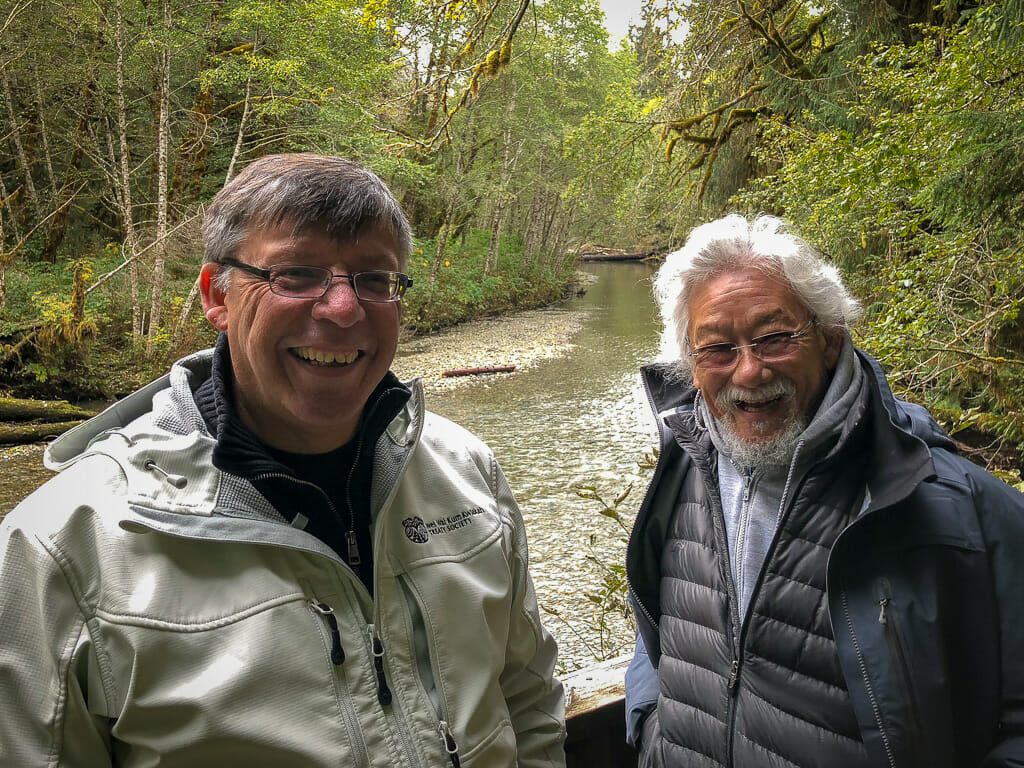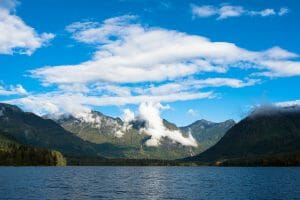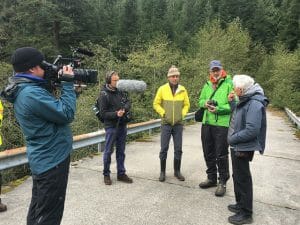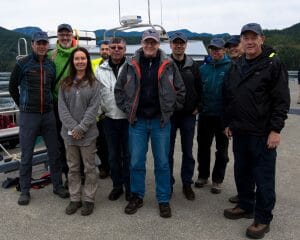Estimated Reading time

4 Mins
The Hidden Life of Trees in Kwiakah Territory

It’s not every day you can say celebrated environmentalist David Suzuki and international best-selling author Peter Wohlleben are coming to pay you a visit. But Chief Steven Dick of Kwiakah First Nation, and Frank Voelker, the Nation’s band manager, were able to do just that when a documentary film crew—whose team included Suzuki and Wohlleben—visited Kwiakah territory in fall 2018.
The film being made by Constantin Film aims to convey the impact of Wohlleben’s immensely popular book, The Hidden Life of Trees: What they Feel, How they Communicate – Discoveries from a Secret World.
The book, which has been translated from German into 41 languages and is a best-seller in 11 countries, presents long-researched concepts which the Smithsonian calls “a revolution…in the scientific understanding of trees.”

Trees, Wohlleben asserts, are social, communicative, and intelligent. Their ecosystems are exceedingly complex, demonstrating collective intelligence similar to a colony of ants. It is the connectedness and communication of forests that have garnered the most media attention, but Voelker says it was Wohlleben’s notion of what a forest is that he was drawn to.
When Voelker read The Hidden Life of Trees he was floored. Not because of the novelty of the concepts, but because of their familiarity. “He was writing what we were thinking,” says Voelker. “I finished the book in one sitting.”
After Voelker read The Hidden Life of Trees, he reached out to Wohlleben to tell him a little more about Kwiakah First Nation, and the history of logging in their territory. Wohlleben was moved and has since been acting as a volunteer adviser for the Nation. So when Constantin Film proposed a documentary based on his book, Wohlleben insisted they visit Chief Dick, Voelker and the Kwiakah First Nation as part of the filming.
We don’t have the same definition of what a forest is.
The Kwiakah First Nation has been for many years, in discussions with the province over the need for increased protection of key areas in its territories, including the watershed of Phillips Arm. Phillips Arm has been hard-hit by industrial-scale logging, much to the detriment of wildlife in the region. “There are only 15 grizzly bears left and 2 black bears,” says Voelker. “To continue to destroy their living space, that population will vanish in our lifetime.”
The conversations with the provincial government have so far proved unsuccessful and after reading Wohlleben’s book, Voelker realized part of the problem is lack of common understanding. “We don’t have the same definition of what a forest is,” Voelker realized.

He says Kwiakah First Nation has a more holistic view of forest ecosystems than provincial foresters and licensees. When he read what Wohlleben—a professional forester for over 30 years—was writing, Voelker knew Western science was finally catching up to what Indigenous knowledge had purported for thousands of years, that—as Voelker puts it—trees don’t make a forest.
This difference in definition has significant impacts for how forests are harvested and managed. “There’s wildlife in the forest, there’s rivers, there’s shrubs, moss, there’s deciduous trees,” he says. All those factions are interconnected, and when an area is heavily logged, the connection is broken.
The idea that logging companies replant forests is a fabrication, says Voelker. They can’t replace old-growth forests, or the ecosystems those forests create. “What they’re doing is creating plantations, not forests.”
Those plantations lack all the complexity of the connections described in The Hidden Life of Trees, and the repercussions are significant. Moisture-rich soils, the thick barks of ancient trees, and the diversity of flora is never truly replaced by replanting.
If you manage forests properly, you create stronger, healthier forests and there is much more valuable timber.

But Chief Steven Dick is clear that his Nation isn’t asking for an end to harvesting trees, it just wants a rethinking of the industry and a move away from industrial logging. “What Peter would say is that if you manage forests properly, you create stronger, healthier forests and there is much more valuable timber,” notes Voelker.
What Kwiakah First Nation wants is for the provincial government to turn over control and harvesting rights of Block 5 in Phillips Watershed. The Nation would like to create a pilot project in the area to find ways to conduct real, sustainable forestry. Voelker says that is most likely done through selective logging which allows forestry and forest recovery to occur simultaneously.
It’s not a small ask, but the neither are the stakes. “We take our responsibility to future generations very seriously,” says Voelker. “We are just a small group with 22 members and look what we can do. If people follow our example, hopefully we will get to a tipping point.”
